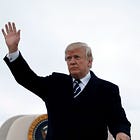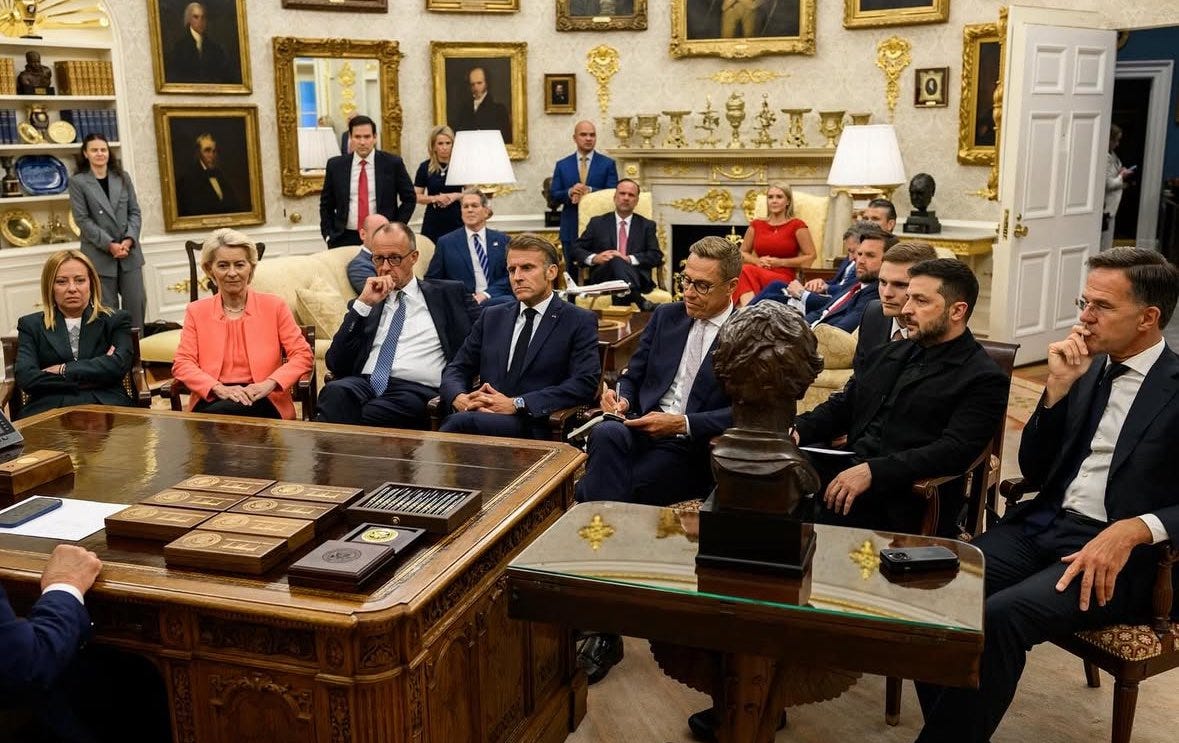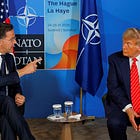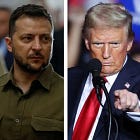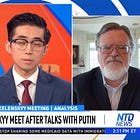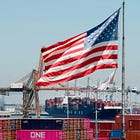Conrad Black: Trump’s Ukraine Talks and the Restoration of NATO
It's not just that Donald Trump has brought real hope for peace in Ukraine. He has also reconstructed and unified the NATO alliance to its strongest point in history.
Don’t miss Rod’s analysis of Trump’s consolidation of American global hegemony.
This essay is free, but with Premium Membership you get MORE. Join today.
by Conrad Black
August 20, 2025
The recent settlement discussions over the Russia–Ukraine war have been decisive in building confidence that the NATO alliance has been effectively reconstructed and unified.
There was a brief torrential downpour of Trump-abuse when he cordially greeted Russian President Putin on the tarmac in Alaska on Aug. 15. It is a generally accepted rule of diplomacy that those attempting to produce an agreement between warring parties treat both parties with reasonable affability, no matter what they may privately think of them.
The asinine European and Canadian fear that Trump was mesmerized by Putin and was cranking up to bully Ukraine into capitulating to Russia was incinerated and its ashes consigned to the bowels of the earth by Trump’s meeting with the principal European leaders at the White House on Aug. 18.
It is worthwhile to recall a few salient facts. When long-serving German Chancellor Angela Merkel declined to give Ukraine anything more useful in repulsing Russian aggression than blankets and helmets, Trump reversed Barack Obama’s defeatist policy and gave the Ukrainians the Javelin missiles that enabled them to defeat Russian tank attacks. He warned Joe Biden of the inadvisability of implying that a Russian incursion to take Russian-speaking areas away from Ukraine would be acceptable, but the conquest of the entire country might not be. When the U.S. Joint Chiefs of Staff predicted an easy Russian conquest of Ukraine within a month, with the implication that there wasn’t much to be done about it, Trump demurred.
Despite his frequent and well-founded railings against the deteriorated state of NATO — which had become an “alliance of the willing,” where the members happily accepted the U.S. military guarantee but only a few countries provided adequately for their own defence, and were generally uninterested in any NATO operation where they weren’t directly involved — Trump was always a partisan of a strong Western Alliance. Some serendipitous combination of Russian aggression and Trump’s threats to withdraw the American military guarantee of slackers in NATO has miraculously produced an approximate tripling of the material commitment to collective defence of the entire alliance, apart from the United States, which carried NATO on its back for decades.
This immeasurably strengthened NATO, materially and in alliance solidarity.
At the White House on Aug. 18, the four principal European leaders — the French president, the German chancellor, and the British and Italian prime ministers — as well as the secretary-general of NATO and the president of the European Commission, all confirmed alliance unanimity to ensure that Ukraine is not overrun. If that happened, it would be a horrible injustice to those courageous people, an act of unspeakable moral cowardice by the Western Alliance, and would effectively undo the principal single strategic consequence of the great and bloodless victory of the West in the Cold War. Next to Russia, Ukraine was the most important unit in the Soviet Union.
Readers will recall that it was only a few months ago when the heads of the European NATO governments and Canada were wringing their hands that the United States was effectively departing the alliance and leaving it to the Western Europeans to prop up Ukraine, which everybody knew they lacked the means and determination to do. This served President Trump’s purpose in gaining an instant grace of conversion to the virtues of all member states contributing according to their means to the common defence.
As a result, NATO has assumed much more power than it ever enjoyed before, given its increased spending commitments and greatly expanded membership compared to its early days as part of the American-devised containment strategy against the Soviet Union. Back then, 11 of its present members were communist states, and Finland and Sweden were ostentatious neutrals.
Optimism is justified over Ukraine. First, the unity of the Western Alliance defeats once and for all the longstanding Russian ambition to fragment it, from Stalin’s offer to West German Chancellor Konrad Adenauer in the early 1950s of the reunification of Germany in exchange for Germany’s neutrality; and Gorbachev’s attempt to bewitch Western Europe with his overtures about “our common European home” as opposed to the solidarity of Western democratic states. Russia’s GDP is smaller than Canada’s or Texas’s, and Russia has sustained over a million casualties in this insane war. It cannot continue indefinitely against so determined an adversary that is so heavily supported by an alliance whose united collective strength is five to ten times as great as Russia’s.
The second reason for optimism is now that Trump has strategically silenced the isolationist section of his following by arranging that Europeans in NATO will buy the most sophisticated American military hardware to pass on to Ukraine to enable that country to familiarize the Russian civil population with the inconveniences of war as the Ukrainian people have themselves courageously endured, without it costing the American taxpayers anything, Russia will not be able to continue this war much longer. And if Putin opts to continue to stipulate unreasonable terms for ending the war, he will, within a few months, be reduced to a state of national penury by Trump’s secondary sanctions. With the possible exception of Belarus, every country in the world, when given the choice of trading with the United States or with Russia, will choose the United States.
The last cause for optimism, though it is also a requirement for unusual diplomatic dexterity, is that almost alone amongst Western statesmen, Trump recognizes that the other Western goal besides preventing the Russian takeover of Ukraine has been to end the war in a way that recognizes Russia’s relatively modest historical claim on the Russian-speaking parts of Ukraine while achieving the indisputable legitimization and security of Ukraine in slightly diminished borders. This would enable Russia to withdraw from the war with a modicum of dignity and recognize that it will do much better in a friendly relationship with the West than continuing as a vassal state of the overweening imperialism of China. It is a little like Richard Nixon obliging Israel not to surround the Egyptian army in the Sinai in 1973, so Egypt could make an honourable peace after a respectable war, and normalize relations with Israel.
On recent form, President Trump will produce such a solution, because he could force Russia to the wall if Putin is unreasonable. Ukraine must be independent, and Russia must be a Western and not an oriental state. This frenzy of denigration of Trump is just a fading echo of the malignant snobbery of Trump-hate.
— This essay is published in cooperation with The Epoch Times.


